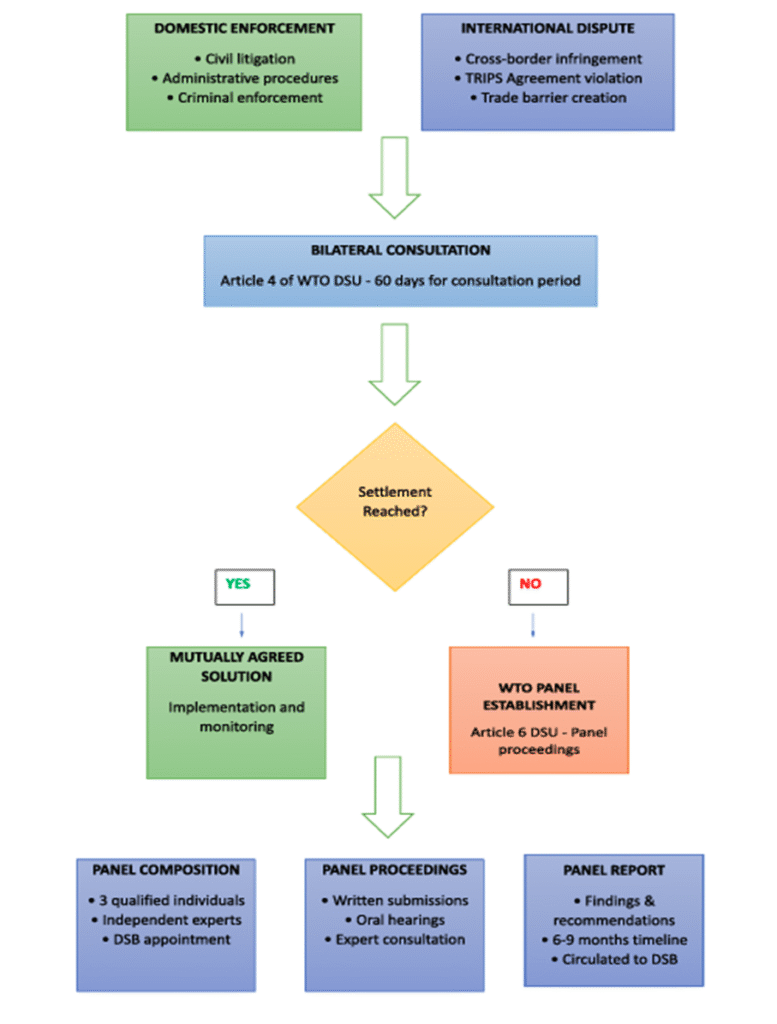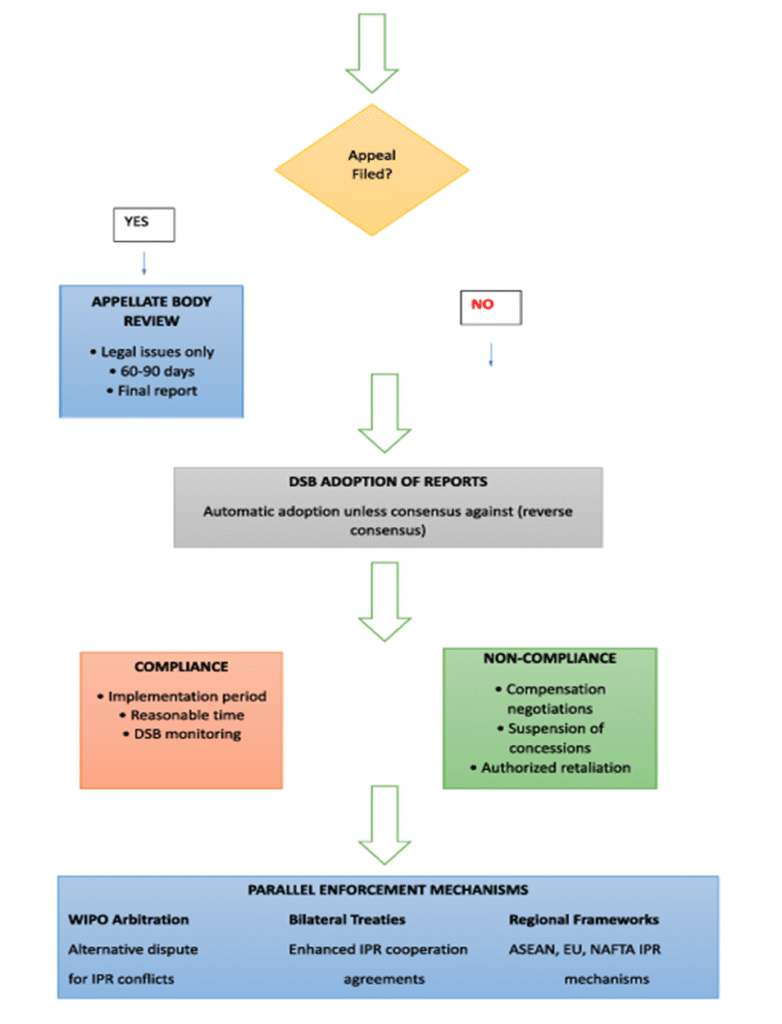
Introduction
Intellectual Property Rights (IPR) enforcement has emerged as a critical determinant in shaping international trade relations in the contemporary global economy. The intersection of IPR protection and trade policy creates complex dynamics that influence bilateral and multilateral commercial relationships, particularly during periods of geopolitical tension. This article examines the intricate relationship between IPR enforcement and trade relations through the lens of India-Pakistan relations, exploring how conflict situations impact intellectual property frameworks and their consequential effects on international commerce.
The significance of this analysis extends beyond bilateral considerations, as it illuminates broader patterns of how IPR enforcement mechanisms function within contested geopolitical spaces. The India-Pakistan relationship, characterized by decades of territorial disputes and intermittent conflicts, provides a compelling case study for understanding how intellectual property regimes operate under stress and their implications for regional and global trade networks.
The India-Pakistan relationship has been marked by persistent tension since the 1947 partition, with multiple armed conflicts, including wars in 1947, 1965, 1971, and the Kargil conflict in 1999. Despite maintaining a ceasefire agreement since 2003, both nations continue to experience periodic escalations, creating an environment of uncertainty that significantly impacts their trade relations and intellectual property cooperation.
Recent developments have further complicated this relationship. The ongoing Kashmir dispute continues to influence bilateral ties, with both countries maintaining significant military presence along the Line of Control. This persistent state of tension has created a unique environment where traditional IPR frameworks must operate within the constraints of limited diplomatic cooperation and frequent trade disruptions.
The enforcement of intellectual property rights between India and Pakistan presents unique challenges that exemplify broader issues in IPR-trade relationships during conflict situations. Both countries are signatories to major international IPR agreements, including the TRIPS Agreement under the World Trade Organization, yet their bilateral IPR cooperation remains severely constrained by political tensions.
A significant illustration emerged in the WTO dispute settlement mechanism, where Pakistan faced challenges regarding its intellectual property framework. In WTO case DS36, the United States raised concerns about Pakistan’s absence of patent protection for pharmaceutical and agricultural chemical products, highlighting how domestic IPR weaknesses can impact international trade relationships and compliance with global standards.
The restricted IPR cooperation between India and Pakistan has created several consequences for their trade relationship:
Trade Volume Constraints: Despite geographical proximity and complementary economies, bilateral trade between India and Pakistan remains significantly below its potential.

Source: UN COMTRADE, Trading Economics, Pakistan Business Council
Note: Data represents official bilateral trade statistics and excludes informal trade channels
Key Observations:
Conflict Impact Analysis:
The lack of robust IPR protection mechanisms has deterred technology transfer and joint ventures that could enhance trade volumes.
Pharmaceutical Sector Implications: Both countries have substantial pharmaceutical industries, yet limited IPR cooperation has prevented optimal collaboration. Indian pharmaceutical companies, known for generic drug production, face uncertainties regarding patent enforcement in Pakistan, while Pakistani firms encounter similar challenges in the Indian market.
Agricultural Technology Transfer: The agricultural sectors of both nations could benefit from enhanced technology sharing, but inadequate IPR frameworks limit such cooperation. Traditional knowledge protection and agricultural patent enforcement remain contentious issues that impact broader trade relationships.
The Agreement on Trade-Related Aspects of Intellectual Property Rights (TRIPS) serves as the primary international framework governing IPR in trade relations. Administered under the World Trade Organization’s auspices, TRIPS establishes minimum standards for IPR protection and enforcement that member countries must implement. The agreement recognizes that intellectual property rights are private rights and emphasizes that IPR enforcement should contribute to technological innovation and knowledge transfer.
Under TRIPS provisions, member countries must provide adequate protection for patents, trademarks, copyrights, industrial designs, geographical indications, and trade secrets. The agreement also mandates effective enforcement mechanisms, including civil and administrative procedures, provisional measures, and border measures to prevent the importation of counterfeit goods.
The World Intellectual Property Organization (WIPO) plays a complementary role to the WTO in establishing global IPR norms. While TRIPS focuses on trade-related aspects of intellectual property, WIPO administers various international treaties and provides technical assistance for IPR system development. The organization’s mandate includes promoting intellectual property protection worldwide and facilitating international cooperation in IPR matters.
WIPO’s relationship with the WTO creates a complex governance structure where norm-setting occurs across multiple institutional frameworks. This institutional interplay becomes particularly significant during international disputes, as countries may seek recourse through different mechanisms depending on the nature of their IPR-related trade conflicts.



Key Abbreviations: DSU – Dispute Settlement Understanding; DSB – Dispute Settlement Body; WTO – World Trade Organization
Timeline: The Total process typically takes 15-24 months from consultation to final resolution
Source: WTO Dispute Settlement Understanding, WIPO Alternative Dispute Resolution
IPR enforcement in international trade operates through several mechanisms:
Dispute Settlement Mechanisms: The WTO’s dispute settlement system provides a forum for resolving IPR-related trade disputes. Countries can challenge each other’s IPR policies if they believe such policies violate TRIPS obligations or create unfair trade barriers.
Border Enforcement Measures: Countries implement border control mechanisms to prevent the importation of goods that infringe intellectual property rights. These measures are crucial for protecting domestic industries and maintaining international IPR standards.
Bilateral and Regional Agreements: Beyond multilateral frameworks, countries often negotiate bilateral or regional agreements that establish enhanced IPR protection standards. These agreements may include provisions for technology transfer, joint research initiatives, and streamlined IPR enforcement procedures.
While not directly an IPR case, the Indus Waters Treaty between India and Pakistan illustrates how bilateral agreements can be affected by broader geopolitical tensions, with implications for all forms of cooperation, including intellectual property matters. The treaty, signed in 1960 and governing water sharing from the Indus River system, has faced numerous challenges that mirror the difficulties encountered in IPR cooperation.
The treaty’s implementation has been complicated by disputes over dam construction, water allocation, and technical assessments. These challenges demonstrate how bilateral cooperation mechanisms can become strained during periods of heightened tension, affecting not only the specific agreement but also broader cooperation frameworks, including those governing intellectual property and trade.
The river water dispute offers several insights relevant to IPR enforcement and trade relations:
Institutional Resilience: Despite political tensions, the Indus Waters Treaty has survived multiple conflicts, suggesting that well-designed institutional frameworks can maintain functionality even during difficult periods. This resilience model could inform IPR cooperation mechanisms.
Technical Cooperation Challenges: The treaty’s implementation has faced difficulties in maintaining technical cooperation and joint fact-finding missions during tense periods. Similar challenges affect IPR enforcement, where technical cooperation in patent examination, trademark registration, and enforcement coordination becomes difficult. Third-Party Mediation: The treaty includes provisions for international mediation and arbitration, mechanisms that could be valuable in IPR disputes between countries with strained bilateral relations.
Despite the challenges evident in the India-Pakistan case, several international examples demonstrate successful IPR cooperation even between countries with complex political relationships:
European Union Framework: The EU’s comprehensive IPR framework has facilitated extensive trade cooperation among member states, including those with historical conflicts. The European Patent Office and Community Trademark systems provide models for regional IPR cooperation.
ASEAN Intellectual Property Cooperation: The Association of Southeast Asian Nations has developed frameworks for IPR cooperation that accommodate diverse political and economic systems while promoting trade growth through enhanced IP protection.
International organizations provide neutral forums for IPR cooperation that can function even when bilateral relations are strained:
WIPO Mediation and Arbitration Services: WIPO offers alternative dispute resolution mechanisms for IPR conflicts that can provide a neutral ground for resolving disputes without engaging broader political tensions.
Regional Development Banks: Institutions like the Asian Development Bank provide technical assistance for IPR system development, creating opportunities for cooperation through multilateral rather than bilateral channels.
The relationship between IPR enforcement and trade relations requires continued attention to several key areas:
Technology Transfer Facilitation: Developing mechanisms that protect intellectual property rights while facilitating legitimate technology transfer can enhance trade relationships even in politically challenging environments.
Capacity Building Initiatives: International organizations can provide technical assistance for IPR system development that benefits all parties while reducing the potential for disputes.
Neutral Enforcement Mechanisms: Creating neutral forums for IPR dispute resolution can help maintain commercial relationships even when broader political relations are strained.
Regional Cooperation Frameworks
Despite bilateral challenges, regional frameworks may offer alternative approaches to IPR cooperation:
South Asian Intellectual Property Framework: Regional organizations like SAARC could potentially provide forums for IPR cooperation that transcend bilateral political difficulties.
Cross-Border Enforcement Cooperation: Developing mechanisms for coordinated enforcement of IPR violations that cross national boundaries can benefit all countries in a region, regardless of their bilateral political relationships.
The analysis of IPR enforcement and trade relations through the India-Pakistan case study reveals the complex interplay between intellectual property rights, international trade, and geopolitical tensions. While political conflicts create significant challenges for bilateral IPR cooperation, the international legal framework provides multiple mechanisms for maintaining intellectual property standards and facilitating trade relationships.
The case demonstrates that effective IPR enforcement requires both robust domestic frameworks and international cooperation mechanisms. Even in challenging political environments, multilateral institutions like WIPO and the WTO provide essential infrastructure for maintaining IPR standards and resolving disputes through neutral forums.
Moving forward, the international community must continue developing flexible mechanisms that can accommodate political tensions while maintaining the integrity of intellectual property systems that underpin global trade relationships. The lessons learned from complex bilateral relationships like that between India and Pakistan can inform broader efforts to strengthen the integration of IPR enforcement and international trade policy.
The ultimate goal remains creating an international system where intellectual property rights are adequately protected and enforced, facilitating innovation and technology transfer while supporting robust trade relationships that benefit all participants in the global economy. This objective requires continued commitment to multilateral cooperation and institutional development, even when bilateral relationships face significant challenges.
Bibliography
Agreement on Trade-Related Aspects of Intellectual Property Rights, Apr. 15, 1994, Marrakesh Agreement Establishing the World Trade Organization, Annex 1C, 1869 U.N.T.S. 299, 33 I.L.M. 1197 (1994)
Council for Foreign Relations, ‘Conflict Between India and Pakistan’ (Global Conflict Tracker, 2025) https://www.cfr.org/global-conflict-tracker/conflict/conflict-between-india-and-pakistan accessed 31 May 2025
Okediji R, ‘WIPO-WTO Relations and the Future of Global Intellectual Property Norms’ (2009) University of Minnesota Law School Faculty Articles https://scholarship.law.umn.edu/faculty_articles/885/ accessed 31 May 2025
US Trade Representative, ‘India – Protecting Intellectual Property’ (Country Commercial Guides, 2025) https://www.trade.gov/country-commercial-guides/india-protecting-intellectual-property accessed 31 May 2025
US Trade Representative, ‘Pakistan – Protecting Intellectual Property’ (Country Commercial Guides, 2025) https://www.trade.gov/country-commercial-guides/pakistan-protecting-intellectual-property accessed 31 May 2025
World Intellectual Property Organization, ‘Intellectual Property Enforcement’ (WIPO, 2025) https://www.wipo.int/en/web/ip-enforcement accessed 31 May 2025
World Trade Organization, ‘Pakistan — Patent Protection for Pharmaceutical and Agricultural Chemical Products’ (WTO Dispute Settlement, Case DS36, 1996) https://www.wto.org/english/tratop_e/dispu_e/cases_e/ds36_e.htm accessed 31 May 2025
World Trade Organization, ‘The WTO and World Intellectual Property Organization’ (WTO, 2025) https://www.wto.org/english/thewto_e/coher_e/wto_wipo_e.htm accessed 31 May 2025
World Trade Organization, ‘Understanding the WTO – Intellectual Property: Protection and Enforcement’ (WTO, 2025) https://www.wto.org/english/thewto_e/whatis_e/tif_e/agrm7_e.htm accessed 31 May 2025
AUTHOR- SUHANI SHARMA
FOURTH YEAR, BBA LLB, ARMY LAW COLLEGE, PUNE
Get started instantly

TMWala
Your one stop shop for all your business registration and compliance needs.
Our Services
© Copyright TMWala. All rights reserved
Choose your Entity Type
Individual/ MSME/ Sole Proprietorships
Non-MSME/ Large Entities

₹1,500.00 Original price was: ₹1,500.00.₹999.00Current price is: ₹999.00.
Trademark Application @ ₹999* (Basic Discounted Plan for MSME/Individual/Sole Proprietorships) Best-Selling, Economical & Easy

₹1,500.00 Original price was: ₹1,500.00.₹999.00Current price is: ₹999.00.
Trademark Application @ ₹999* (Basic Discounted Plan for Non-MSMEs/Large Entities) Best-Selling, Economical, Quick and Easy
Choose your Entity Type
Individual/ MSME/ Sole Proprietorships
Non-MSME/ Large Entities
₹3,500.00 Original price was: ₹3,500.00.₹1,999.00Current price is: ₹1,999.00.
Government Fees
₹4500/-
₹3,500.00 Original price was: ₹3,500.00.₹1,999.00Current price is: ₹1,999.00.
Government Fees
₹9000/-
Choose your Entity Type
Non-MSME/ Large Entitie
Individual/ MSME/ Sole Proprietorships

₹9,000.00 Original price was: ₹9,000.00.₹3,999.00Current price is: ₹3,999.00.
Trademark Application @ ₹3999* (Premium Discounted Plan for Non-MSMEs/Large Entities) Comprehensive
Government Fees
₹9000/-

₹9,000.00 Original price was: ₹9,000.00.₹3,999.00Current price is: ₹3,999.00.
Trademark Application @ ₹3999* (Premium Discounted Plan for MSME/Individual/Sole Proprietorships) Comprehensive
Government Fees
₹4500/-